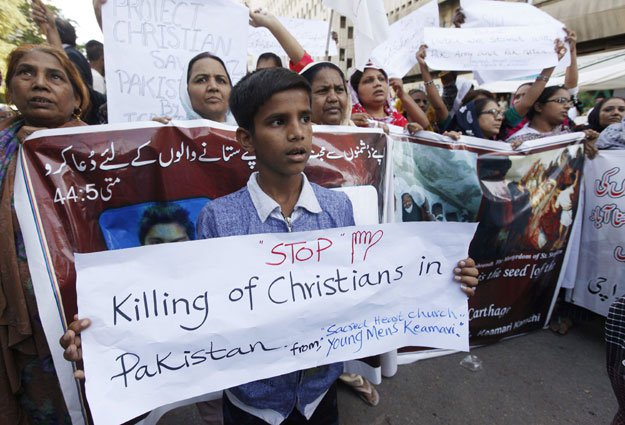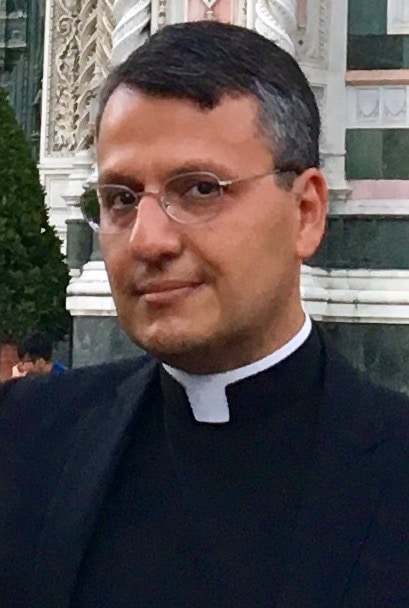Pope Defends Immigrants…What About Persecuted Christians?

A court in the eastern Pakistani city of Lahore has sentenced a Christian man to death for having committed “blasphemy,” his lawyer says, in the latest case of Pakistan’s strict religious laws being applied against Christians and other religious minorities.
As reported by Al-Jazeera News, Asif Pervaiz, 37, has been in custody since 2013 when he was accused of having sent “blasphemous” text messages to a former supervisor at work.
Speaking in his own defense in court earlier in the trial, Pervaiz stated that a supervisor confronted him after he quit work at the factory that employed him. Pervaiz’s boss was trying to get him to convert to Islam. When he refused to submit, Pervaiz was accused of sending blasphemous text messages about the Prophet Muhammad to his former supervisor; the latter never provided a single shred of evidence to prove his claim.
Pervaiz told the court his supervisor made the accusation only after he had refused to convert to Islam. The complainant’s lawyer, Murtaza Chaudhry, denied this was the case.
In Pakistan, false accusations of blasphemy are widespread and often motivated by personal vendettas or religious hatred, as it was with Asia Bibi — her crime was drinking water from a cup that was reserved for Muslim women. Accusations are highly inflammatory and have the potential to spark mob lynchings, vigilante murders and mass protests.
At present, 25 Christian are imprisoned on blasphemy charges in Pakistan, including Asif Pervaiz. Human rights groups say blasphemy laws are often used to persecute Christians and other non-Muslims — at times they have even been used against Muslims to settle personal rivalries.
In July a Christian and U.S. citizen of Pakistani origin, who was on trial for blasphemy trial in the northwestern city of Peshawar, was shot dead in the courtroom by a teenager. The young man bragged to bystanders he killed him for insulting the Prophet Muhammad.
According to Fr. Tariq Isaac, a Catholic priest who lived in Pakistan for nearly two decades, most Pakistani Catholics and Protestants have experienced some form of direct personal discrimination, and the majority of their countrymen automatically dislike them because of their faith.
Although the National Commission for Justice and Peace founded by the Pakistani Catholic Bishops’ Conference has continually protested against the sharia-based penal laws against blasphemy, the approach from the head of the Catholic Church has been different.
While Pope Francis in 2018 denounced the “sterile hypocrisy” of those who turn a blind eye to the world’s poor, he publicly remained “neutral” with the aforementioned Asia Bibi case.
Although acquitted by Pakistan’s Supreme Court on blasphemy charges (for which she spent nearly a decade in prison), she had initially been unable to leave the country because she had not been immediately offered asylum by a Western country — she now resides in Canada.
When her husband, Ashiq Masih, asked the Italian government to assist on this matter, Vatican Secretary of State Cardinal Pietro Parolin, speaking for the pope, stated:
“It’s an internal matter of Pakistan, I hope it can be resolved in the best way…I do not know how it will end, there have been many reactions…The question is not simple, it is very complex and delicate. Always we hope that it ends in the best way.”
Like the Asia Bibi “non-interference” position on the part of Francis, we should not be surprised that Asif Pervaiz is not, at least for the time being, getting any support from the hierarchy in Rome. This, in fact, falls within the Vatican’s Islamic political agenda, as the the Bishop of Rome continually insists Islam is a religion of peace and that it can and should coexist in the Western world (notwithstanding the violent verses in both the Quran and the hadiths that call for the Islamization of society).
As I have publicly stated in the past, I do not wish, nor is it my place, to judge the intentions of church officials, but it is difficult not to question their actions in light of the enmity the pope feels against world politicians who oppose immigration. Is this the only response by the Church to the Islamic body politic that governs according to the draconian norms of sharia law?
Willfully omitting any criticisms of those Islamic regimes that continue to commit human rights violations in the name of Islam makes his defense for the marginalized and disadvantaged come off as shallow. In fact, he has been harsh on those who speak the truth about the Islamist threat.
While it is understandable why the Vatican does not want to take a public position that would create severe backlash for those persecuted in Islamist countries, pragmatic diplomacy cannot be pursued at the cost of standing up for human rights, for it only emboldens the Islamist elite.
Yet, as with Western politicians, Church leaders betray their own principles and abandon Christians and other religious minorities of the Middle East and in other parts of the world where they are being persecuted.
In other words, they too contribute to the chaos created by Islamists.
__________________________________________________

Mario Alexis Portella is a priest of the Cathedral of Santa Maria del Fiore and Chancellor of the Archdiocese of Florence, Italy. He has a doctorate in canon law and civil law from the Pontifical Lateran University in Rome; he also holds a M. A. in Medieval History from Fordham University, as well as a B.A. in Government & Politics from St. John’s University. He is also the author of Islam: Religion of Peace? – The Violation of Natural Rights and Western Cover-Up.
Book available on Amazon, Barnes & Noble or WestBow Press.






Recent Comments